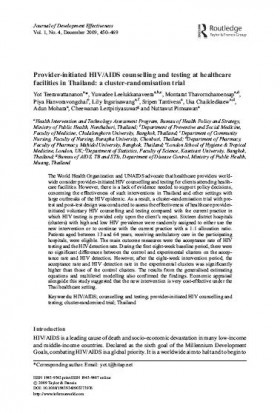This website uses cookies so that we can provide you with the best user experience possible. Cookie information is stored in your browser and performs functions such as recognising you when you return to our website and helping our team to understand which sections of the website you find most interesting and useful.
Provider-initiated HIV/AIDS counselling and testing at healthcare facilities in Thailand: a cluster-randomisation trial. (2009)

Details
Provider-initiated HIV/AIDS counselling and testing at healthcare
facilities in Thailand: a cluster-randomisation trial.
Yot Teerawattananon1, Yuwadee Leelukkanaveera1,2,3, Montarat Thavorncharoensap1,4, Piya Hanvoravongchai5,
Lily Ingsrisawang1,6, Sripen Tantivess1, Usa Chaikledkaew1,4, Adun Mohara1, Cheewanan Lertpiriyasuwat7
and Nuttawut Pimsawan1
1 Health Intervention and Technology Assessment Program, Bureau of Health Policy and Strategy, Ministry of Public Health, Nonthaburi, Thailand;
2 Department of Preventive and Social Medicine, Faculty of Medicine, Chulalongkorn University, Bangkok, Thailand;
3 Department of Community Nursing, Faculty of Nursing, Burapha University, Chonburi, Thailand;
4 Department of Pharmacy, Faculty of Pharmacy, Mahidol University, Bangkok, Thailand;
5 London School of Hygiene & Tropical Medicine, London, UK;
6 Department of Statistics, Faculty of Science, Kasetsart University, Bangkok,Thailand;
7 Bureau of AIDS, TB and STIs, Department of Disease Control, Ministry of Public Health, Muang, Thailand
Introduction
The World Health Organization and UNAIDS advocate that healthcare providers worldwide consider provider-initiated HIV counselling and testing for clients attending healthcare facilities. However, there is a lack of evidence needed to support policy decisions, concerning the effectiveness of such interventions in Thailand and other settings with large outbreaks of the HIV epidemic. As a result, a cluster-randomisation trial with pretest and post-test design was conducted to assess the effectiveness of healthcare providerinitiated voluntary HIV counselling and testing compared with the current practice in which HIV testing is provided only upon the client’s request. Sixteen district hospitals (clusters) with high and low HIV prevalence were randomly assigned to either use the new intervention or to continue with the current practice with a 1:1 allocation ratio. Patients aged between 13 and 64 years, receiving ambulatory care in the participating hospitals, were eligible. The main outcome measures were the acceptance rate of HIV testing and the HIV detection rate. During the first eight-week baseline period, there were no significant differences between the control and experimental clusters on the acceptance rate and HIV detection. However, after the eight-week intervention period, the acceptance rate and HIV detection rate in the experimental clusters was significantly higher than those of the control clusters. The results from the generalised estimating equations and multilevel modelling also confirmed the findings. Economic appraisal alongside this study suggested that the new intervention is very cost-effective under the Thai healthcare setting.
Link: http://www.informaworld.com/smpp/content~db=all~content=a917793516




